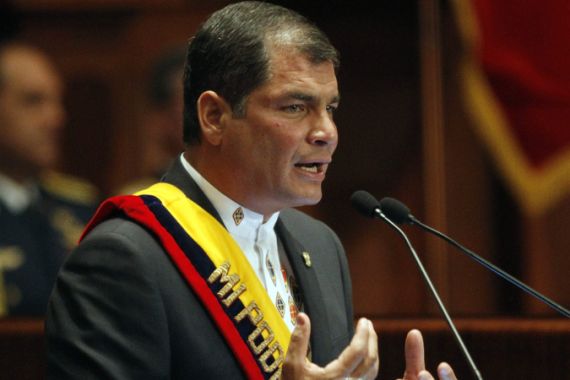Ecuador invites UK to Assange talks
President Rafael Correa says UK must guarantee it will not enter embassy where WikiLeaks founder has taken shelter.

Ecuador’s president has invited the UK to talks over the fate of WikiLeaks founder Julian Assange on the condition that Britain guarantee it will not enter the diplomatic mission in London where Assange has sought shelter.
Computer hacker Assange, who is wanted by Sweden for questioning over sexual-assault accusations, jumped bail and fled to the Ecuadorian embassy nine weeks ago.
“Despite that rude, impertinent and unacceptable remark, we’re still open to dialogue,” President Rafael Correa said on Tuesday, referring to a statement issued by William Hague, UK foreign secretary, last week.
“We don’t expect an apology, but of course we expect Britain to retract the extremely serious mistake they made when they issued the threat that they could violate our diplomatic mission to arrest Mr Julian Assange.”
Assange made an appearance on a balcony of the embassy, in London’s Knightsbridge district, on Tuesday before an audience of activists and a heavy police presence lining the streets.
He called on the US to end what he called its “witch-hunt” against him.
Swedes angered
Assange’s accusations have angered many in Sweden, who say the stories of two women who made the sex-crime allegations have played second fiddle to unwarranted theories of a US-led conspiracy to extradite him with the help of allies in Europe.
The prosecutor’s office has sought Assange for questioning over suspected rape to a less severe degree, unlawful coercion and two cases of sexual molestation.
The lawyer for the two Swedish women stood by the allegations and criticised Assange for not coming back to be questioned.
“It’s an abuse of the asylum instrument, the purpose of which is to protect people from persecution and torture … It’s not about that here,” Claes Borgstrom told Reuters news agency.
Correa granted Assange political asylum earlier this month and has said Assange is welcome to stay in the London embassy indefinitely, but the UK has pledged not to allow Assange to leave the country.
The British government has also said it will not raid Ecuador’s embassy, though police are stationed both outside and inside the building that houses the embassy offices.
“We will not allow Mr Assange safe passage out of the UK, nor is there any legal basis for us to do so. The UK does not accept the principle of diplomatic asylum,” Hague said in a statement on Thursday.
“It is far from a universally accepted concept: the United Kingdom is not a party to any legal instruments which require us to recognise the grant of diplomatic asylum by a foreign embassy in this country.”
International law
Ricardo Patino, Ecuadorian foreign minister, responded to Hague’s statement by saying such a move would be a “flagrant violation” of international law.
It is not possible for British authorities to enter the Ecuadorian embassy under the terms of international law.
Article 22 of the Vienna Convention on Diplomatic Relations states that the premises of a diplomatic mission are “inviolable” and agents of a state “may not enter them to perform law enforcement [or other] functions without the consent of the head of the diplomatic mission”.
The 41-year-old Australian national has said he believes he will eventually be sent to the US to face an unfair espionage prosecution arising from WikiLeaks’s release of hundreds of thousands of secret US government documents.
However, Bob Carr, Australia’s foreign minister, said on Wednesday that Assange was unlikely to be extradited from Sweden to the US if there was a risk of the death penalty or a military court.
Correa, for his part, has rallied support for his decision among fellow left-leaning Latin American nations and has characterised the diplomatic row with the UK as a confrontation with an “imperialist” and “colonial” power.
Though Correa has fought with privately owned media outlets in his own country, hundreds of people rallied in the Ecuadorian capital, Quito, earlier this week to support Assange’s asylum bid, saying it was crucial to protect free speech.